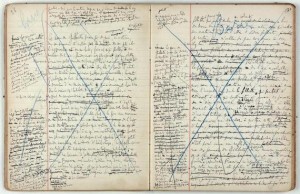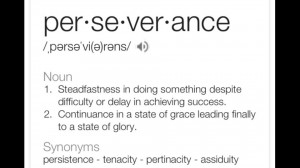“Evidence Lost: We’re Not Likely to See Editing Like Proust’s in the Future”
One page from the notebooks of Marcel Proust shows the extreme work that went into writing his masterpiece In Search of Lost Time
Bibliotheque nationale de France (click to expand)
“This image comes from the notebooks of Marcel Proust, one page among the thousands that would eventually become
In Search of Lost Time. Though there are a few sections in his manuscripts that seem to have come out more or less as the author had hoped (see
here for example), many, many more display whole passages discarded or rewritten like you see one the pages above.
At first, the aggressive self-editing gives you pause: Man, Proust was hard on himself! We are not used to seeing the trail of the hard work that goes into making a beautiful book or essay; computers, like word processors before them, have hidden the the physical evidence of this process. In some places you can still catch glimpses of it — the history tab of a Wikipedia page — but mostly, if this trail exists at all it exists in a private file, the track changes of a Microsoft Word document or the revisions history of a Google Doc.
Efforts like Etherpad, which promised to allow real-time collaboration while recording every keystroke of change to a document, show something else too: In our age of networked writing, a tool that records editing history exists for collaboration. This is true of all of the examples I just gave — Wikipedia, Google Docs, Word’s track changes, and Etherpad. Can you imagine tracking the changes of your own edits, just for yourself? Who would do that? If any of these records make it to the future for scholars to examine, they will be the records of our collaborations. The work of an individual’s self-edits will have been scrubbed.
Proust may have been writing In Search of Lost Time, but in the act of doing so he was creating an object that preserved, in a sense, the time he had lost (“lost”) while writing the books.”



